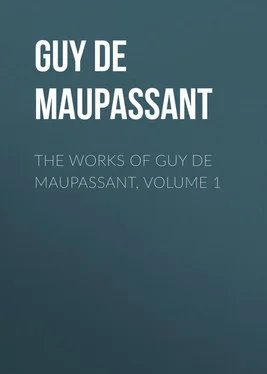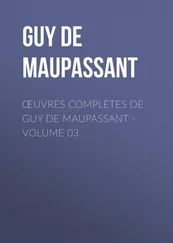Guy Maupassant - The Works of Guy de Maupassant, Volume 1
Здесь есть возможность читать онлайн «Guy Maupassant - The Works of Guy de Maupassant, Volume 1» — ознакомительный отрывок электронной книги совершенно бесплатно, а после прочтения отрывка купить полную версию. В некоторых случаях можно слушать аудио, скачать через торрент в формате fb2 и присутствует краткое содержание. Жанр: literature_19, foreign_antique, foreign_prose, на английском языке. Описание произведения, (предисловие) а так же отзывы посетителей доступны на портале библиотеки ЛибКат.
- Название:The Works of Guy de Maupassant, Volume 1
- Автор:
- Жанр:
- Год:неизвестен
- ISBN:нет данных
- Рейтинг книги:4 / 5. Голосов: 1
-
Избранное:Добавить в избранное
- Отзывы:
-
Ваша оценка:
- 80
- 1
- 2
- 3
- 4
- 5
The Works of Guy de Maupassant, Volume 1: краткое содержание, описание и аннотация
Предлагаем к чтению аннотацию, описание, краткое содержание или предисловие (зависит от того, что написал сам автор книги «The Works of Guy de Maupassant, Volume 1»). Если вы не нашли необходимую информацию о книге — напишите в комментариях, мы постараемся отыскать её.
The Works of Guy de Maupassant, Volume 1 — читать онлайн ознакомительный отрывок
Ниже представлен текст книги, разбитый по страницам. Система сохранения места последней прочитанной страницы, позволяет с удобством читать онлайн бесплатно книгу «The Works of Guy de Maupassant, Volume 1», без необходимости каждый раз заново искать на чём Вы остановились. Поставьте закладку, и сможете в любой момент перейти на страницу, на которой закончили чтение.
Интервал:
Закладка:
Having therefore engaged a large diligence with four horses for the journey, and ten persons having entered their names at the livery stable office, they resolved to start on the Tuesday morning before daybreak, to avoid all public remark.
For some days already the ground had been hard with frost, and on the Monday, about three o'clock in the afternoon, thick dark clouds coming up from the north brought the snow, which fell without intermission all the evening and during the whole night.
At half past four the travelers were assembled in the courtyard of the Hotel de Normandie, from whence they were to start.
They were all still half asleep, their teeth chattering with cold in spite of their thick wraps. It was difficult to distinguish one from another in the darkness, their heaped-up winter clothing making them look like fat priests in long cassocks. Two of the men, however, recognized each other; they were joined by a third, and they began to talk. "I am taking my wife with me," said one. "So am I." "And I too." The first one added: "We shall not return to Rouen, and if the Prussians come to Havre we shall slip over to England."
They were all like-minded and all had the same project.
Meanwhile there was no sign of the horses being put in. A small lantern carried by a hostler appeared from time to time out of one dark doorway only to vanish instantly into another. There was a stamping of horses' hoofs deadened by the straw of the litter, and the voice of a man speaking to the animals and cursing sounded from the depths of the stables. A faint sound of bells gave evidence of harnessing, and became presently a clear and continuous jingle timed by the movement of the beast, now stopping, now going on again with a brisk shake, and accompanied by the dull tramp of hob-nailed sabots.
A door closed sharply. All sound ceased. The frozen travelers were silent, standing stiff and motionless. A veil of white snow-flakes glistened incessantly as it fell to the ground, blotting out the shape of things, powdering everything with an icy froth; and in the utter stillness of the town, quiet and buried under its winter pall, nothing was audible but this faint, fluttering, and indefinable rustle of falling snow – more a sensation than a sound – the intermingling of ethereal atoms seeming to fill space, to cover the world.
The man reappeared with his lantern, dragging after him by a rope a dejected and unwilling horse. He pushed it against the pole, fixed the traces, and was occupied for a long time in buckling the harness, having only the use of one hand as he carried the lantern in the other. As he turned away to fetch the other horse he caught sight of the motionless group of travelers, by this time white with snow. "Why don't you get inside the carriage?" he said, "you would at least be under cover."
It had never occurred to them, and they made a rush for it. The three men packed their wives into the upper end and then got in themselves, after which other distinct and veiled forms took the remaining seats without exchanging a word.
The floor of the vehicle was covered with straw into which the feet sank. The ladies at the end, who had brought little copper charcoal foot-warmers, proceeded to light them, and for some time discussed their merits in subdued tones, repeating to one another things which they had known all their lives.
At last, the diligence having been furnished with six horses instead of four on account of the difficulties of the road, a voice outside asked, "Is everybody here?" A voice from within answered "Yes," and they started.
The conveyance advanced slowly – slowly – the wheels sinking in the snow; the whole vehicle groaned and creaked, the horses slipped, wheezed, and smoked, and the driver's gigantic whip cracked incessantly, flying from side to side, twining and untwining like a slender snake, and cutting sharply across one or other of the six humping backs, which would thereupon straighten up with a more violent effort.
Imperceptibly the day grew. The airy flakes which a traveler – a Rouennais "pur sang" – once likened to a shower of cotton, had ceased to fall; a dirty gray light filtered through the heavy thick clouds which served to heighten the dazzling whiteness of the landscape, where now a long line of trees crusted with icicles would appear, now a cottage with a hood of snow.
In the light of this melancholy dawn the occupants of the diligence began to examine one another curiously.
Right at the end, in the best seats, opposite to one another, dozed Madame and Monsieur Loiseau, whole-sale wine merchant of the Rue Grand Pont.
The former salesman of a master who had become bankrupt, Loiseau had bought up the stock and made his fortune. He sold very bad wine at very low prices to the small country retail dealers, and enjoyed the reputation among his friends and acquaintances of being an unmitigated rogue, a thorough Norman full of trickery and jovial humor.
His character for knavery was so well established that one evening at the Prefecture, Monsieur Tournel, a man of keen and trenchant wit, author of certain fables and songs – a local glory – seeing the ladies growing drowsy, proposed a game of "L'oiseau vole." 1 1 Literally, "The bird flies" – a pun on the verb voler, which means both "to fly" and "to steal."
The pun itself flew through the prefect's reception rooms and afterwards through the town, and for a whole month called up a grin on every face in the province.
Loiseau was himself a noted wag and famous for his jokes both good and bad, and nobody ever mentioned him without adding immediately, "That Loiseau is simply priceless!"
He was of medium height with a balloon-like stomach and a rubicund face framed in grizzled whiskers. His wife – tall, strong, resolute, loud in voice and rapid of decision – represented order and arithmetic in the business, which he enlivened by his jollity and bustling activity.
Beside them, in a more dignified attitude as befitted his superior station, sat Monsieur Carré-Lamadon, a man of weight; an authority on cotton, proprietor of three branch businesses, officer of the Legion of Honor and member of the General Council. All the time of the Empire he had remained leader of a friendly opposition, for the sole purpose of making a better thing out of it when he came round to the cause which he had fought with polite weapons, to use his own expression. Madame Carré-Lamadon, who was much younger than her husband, was the consolation of all officers of good family who might be quartered at the Rouen garrison. She sat there opposite to her husband, very small, very dainty, very pretty, wrapped in her furs, and regarding the lamentable interior of the vehicle with despairing eyes.
Their neighbors, the Count and Countess Hubert de Breville, bore one of the most ancient and noble names in Normandy. The Count, an elderly gentleman of dignified appearance, did all in his power to accentuate by every artifice of the toilet his natural resemblance to Henri Quatre, who, according to a legend of the utmost glory to the family, had honored with his royal embraces a Dame de Breville, whose husband had, in consequence, been made Count and Governor of the province.
A colleague of Monsieur Carré-Lamadon in the General Council, Count Hubert represented the Orleanist faction in the department. The history of his marriage with the daughter of a small tradesman of Nantes had always remained a mystery. But as the Countess had an air of grandeur, understood better than any one else the art of receiving, passed even for having been beloved by one of the sons of Louis Philippe, the neighboring nobility bowed down to her, and her salon held the first place in the county, the only one which preserved the traditions of the viel le galanterie and to which the entreé was difficult.
Читать дальшеИнтервал:
Закладка:
Похожие книги на «The Works of Guy de Maupassant, Volume 1»
Представляем Вашему вниманию похожие книги на «The Works of Guy de Maupassant, Volume 1» списком для выбора. Мы отобрали схожую по названию и смыслу литературу в надежде предоставить читателям больше вариантов отыскать новые, интересные, ещё непрочитанные произведения.
Обсуждение, отзывы о книге «The Works of Guy de Maupassant, Volume 1» и просто собственные мнения читателей. Оставьте ваши комментарии, напишите, что Вы думаете о произведении, его смысле или главных героях. Укажите что конкретно понравилось, а что нет, и почему Вы так считаете.












